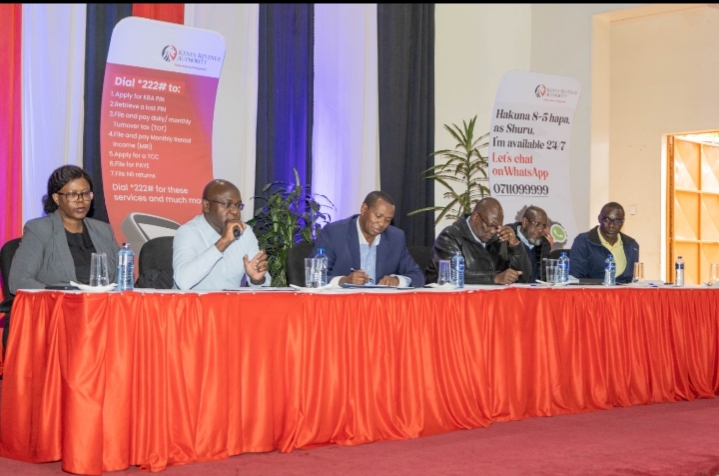KRA Unveils Stationless PIN Service to Transform Taxpayer Experience

The Kenya Revenue Authority (KRA) has announced plans to introduce a new Stationless Personal Identification Number (PIN) Service Delivery model to make it easier and more convenient for taxpayers to access services across the country.
The initiative will allow taxpayers to seek assistance from any KRA Taxpayer Service Office regardless of where they registered their PINs. The new approach is aimed at reducing delays, eliminating bureaucracy, and enhancing efficiency in how KRA delivers services to citizens and businesses.
For many years, taxpayers were required to visit the same KRA office where they registered their PINs in order to receive assistance. This often led to long queues and inconveniences, particularly for those who had relocated or operated in different regions. The new stationless model seeks to address these challenges by creating flexibility and improving the taxpayer experience.
Speaking during a Citizen Assembly Forum in Nairobi, KRA Board Chairman Ndiritu Muriithi said the Authority is retooling how taxpayers access its services to align with the evolving needs of the public.
“In our engagements with taxpayers, we have observed a growing demand for convenience, flexibility, and reduced bureaucracy in how services are delivered and accessed,” said Muriithi. “To enhance customer experience and satisfaction, KRA plans to introduce Stationless PIN Service Delivery that will provide end-to-end support and allow taxpayers to have their issues resolved at the first point of contact without being referred to another office.”
He said the move marks another milestone in KRA’s digital transformation journey which aims to improve taxpayer experience, reduce administrative bottlenecks, and promote voluntary compliance.
KRA Commissioner General Humphrey Wattanga said the initiative aligns with the Authority’s Ninth Corporate Plan which focuses on placing the taxpayer at the center of all service delivery efforts.
“Under the Ninth Corporate Plan, we are redesigning KRA to be customer-centric in order to serve taxpayers better through simplified tax processes,” said Wattanga. “The introduction of Stationless PIN Service Delivery will mark a major step in simplifying tax registration, promoting voluntary compliance, and increasing customer satisfaction among taxpayers across the country.”
He explained that KRA’s goal is to make registration, filing, and payment processes as seamless as possible so that taxpayers can focus on building their businesses and improving their livelihoods while the Authority focuses on service excellence.
Currently, most taxpayer services under the Domestic Taxes Department are managed through a station-based system where tasks are assigned to Tax Service Offices depending on a taxpayer’s turnover or physical location. Large and medium taxpayers are handled according to their turnover while micro and small taxpayers are attached to their physical addresses.
For Customs services, assistance is provided through border stations, Inland Container Depots, Bonded Warehouses, or centrally from KRA headquarters. Although this model has served the Authority for many years, it has also created administrative delays, service inconsistencies, and increased compliance costs for taxpayers.
To complement the ongoing reforms, KRA has also introduced digital tools aimed at improving service delivery. One of these innovations is a USSD solution that allows taxpayers to access key services without internet connectivity or a smartphone. By dialing *222# and selecting Option 5 for KRA services, taxpayers can now retrieve or verify their PINs and access essential services directly from any mobile phone.
In addition, KRA has launched a WhatsApp chatbot that provides interactive support for smartphone users. The chatbot enables faster query resolution and provides instant access to information about KRA services.
These digital innovations reflect KRA’s broader vision of becoming an agile and modern tax administration agency that embraces technology to improve customer experience.
Currently, the Authority operates 136 service points across Kenya and serves an estimated 22 million registered taxpayers. However, the concentration of these offices in urban areas has limited accessibility for people living in rural or underserved regions.
To bridge this gap, KRA is adopting an agent model similar to those used by banks and mobile service providers to expand its presence across the country. The first phase of this program will see the recruitment of 10,000 agents before the end of the year. These agents will offer basic services such as registration, tax filing, and payment facilitation.
The announcement coincides with this year’s Customer Service Week which is being celebrated globally under the theme “Mission: Possible.” The theme reflects KRA’s commitment to making tax compliance easier and more accessible through innovation and improved service delivery.
Wattanga emphasized that the ongoing reforms are designed to strengthen trust between the Authority and taxpayers while creating a culture of voluntary compliance.
“Our mission is to make it as easy as possible for taxpayers to interact with us,” he said. “By simplifying procedures and removing barriers, we are building a system where compliance is voluntary, convenient, and transparent.”
The introduction of Stationless PIN Service Delivery, together with KRA’s other technological and customer-focused initiatives, demonstrates the Authority’s determination to modernize tax administration and make service delivery faster, more reliable, and more inclusive.
As KRA continues its digital transformation, taxpayers across the country can expect a smoother, more efficient, and more customer-friendly experience in the coming months.




